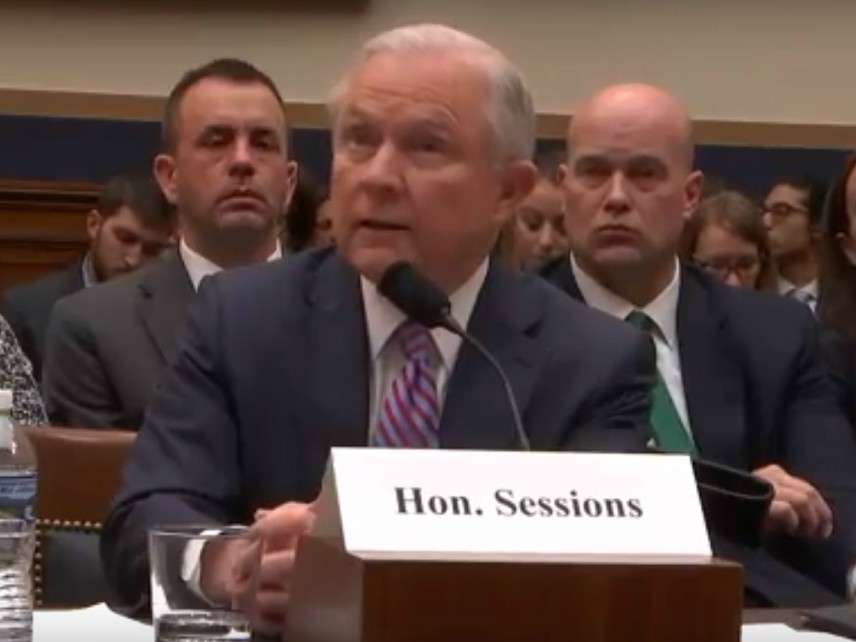Sessions Says He Is Sticking With His Predecessors' Tolerance of State-Legal Marijuana
The attorney general, who conceded that good people do smoke marijuana, gave no indication of an impending crackdown.

Testifying before the House Judiciary Committee today, Attorney General Jeff Sessions confirmed that he is not abandoning his predecessors' policy of prosecutorial forbearance regarding state-licensed marijuana businesses. "Our policy is the same, really, fundamentally, as the Holder-Lynch policy, which is that the federal law remains in effect and a state can legalize marijuana for its law enforcement purposes, but it still remains illegal with regard to federal purposes," Sessions said in response to a question from Rep. Steve Chabot (R-Ohio).
Sessions left unsaid another key aspect of that policy, which was outlined in a 2013 memo from Deputy Attorney General James Cole. Cole encouraged federal prosecutors to leave state-legal cannabusinesses alone unless they impinge on "federal law enforcement priorities" such as preventing underage consumption, interstate smuggling, and drugged driving or other "adverse public health consequences." While the Cole memo leaves a lot of leeway for an attorney general who wants to take a harder line on marijuana, Sessions so far has not taken advantage of it, and he gave no indication today that he plans to do so, notwithstanding his own strong anti-pot prejudices.
Speaking of which, Rep. Steve Cohen (D-Tenn.) noted that Sessions had "said at one time that 'good people don't smoke marijuana.'" Cohen listed a bunch of prominent Republicans who are known to have smoked marijuana, including John Kasich, George Pataki, Rick Santorum, Newt Gingrich, Ted Cruz, Jeb Bush, George W. Bush, Arnold Schwarzenegger, and Clarence Thomas. "Which of those are not good people?" Cohen asked.
In response, Sessions said his statement that "good people don't smoke marijuana," which he made during a Senate hearing last year, should not be interpreted to mean that good people don't smoke marijuana. He said he only meant that it is salutary for the youth of America to believe that good people don't smoke marijuana, even if it is not true, because that belief will discourage them from messing with the devil's weed. "The question was, what do you about drug use, the epidemic we're seeing in the country," he said. "Part of that is a cultural thing. I explained how, when I became United States attorney in 1981, and the drugs were being used widely, over a period of years, it became unfashionable, unpopular, and people were seen, and it was seen as such, that good people didn't use marijuana. That was the context of that statement."
Cohen also got Sessions to concede that "marijuana is not as dangerous as heroin" and that he is bound to obey a spending rider approved by Congress that bars the Justice Department from interfering with the implementation of state medical marijuana laws, which federal courts have interpreted to mean that people cannot be prosecuted for actions that comply with those laws. This year Sessions urged legislators not to renew that rider.


Show Comments (51)